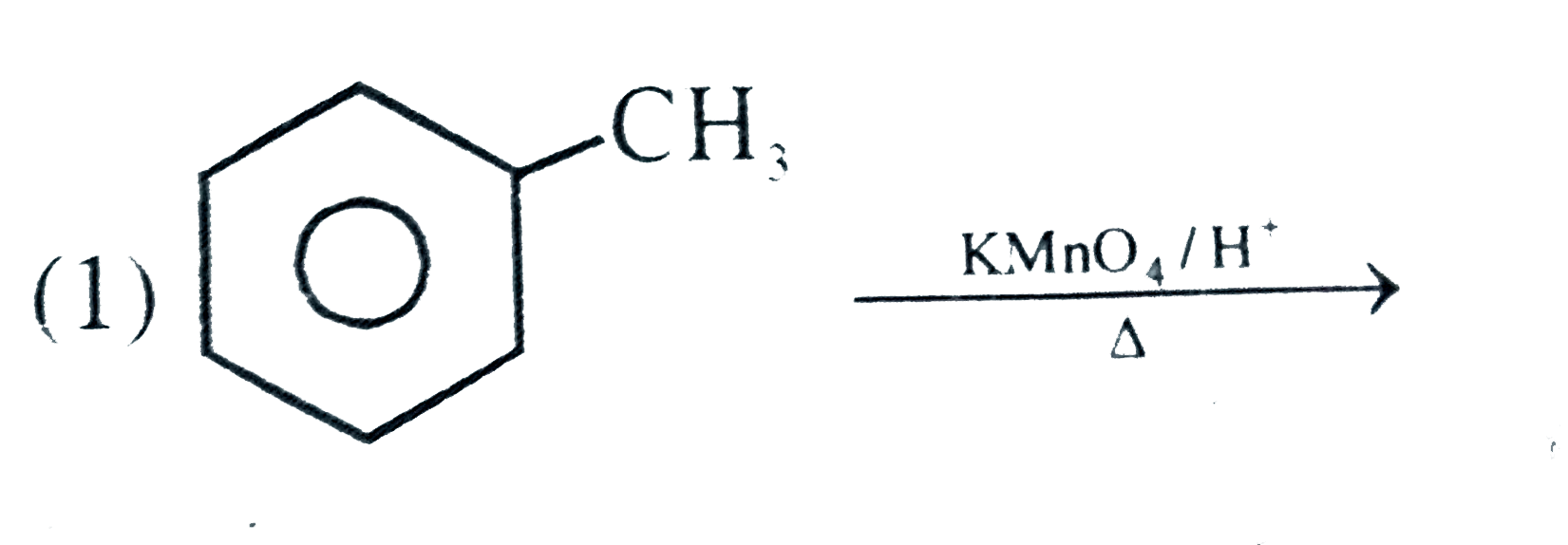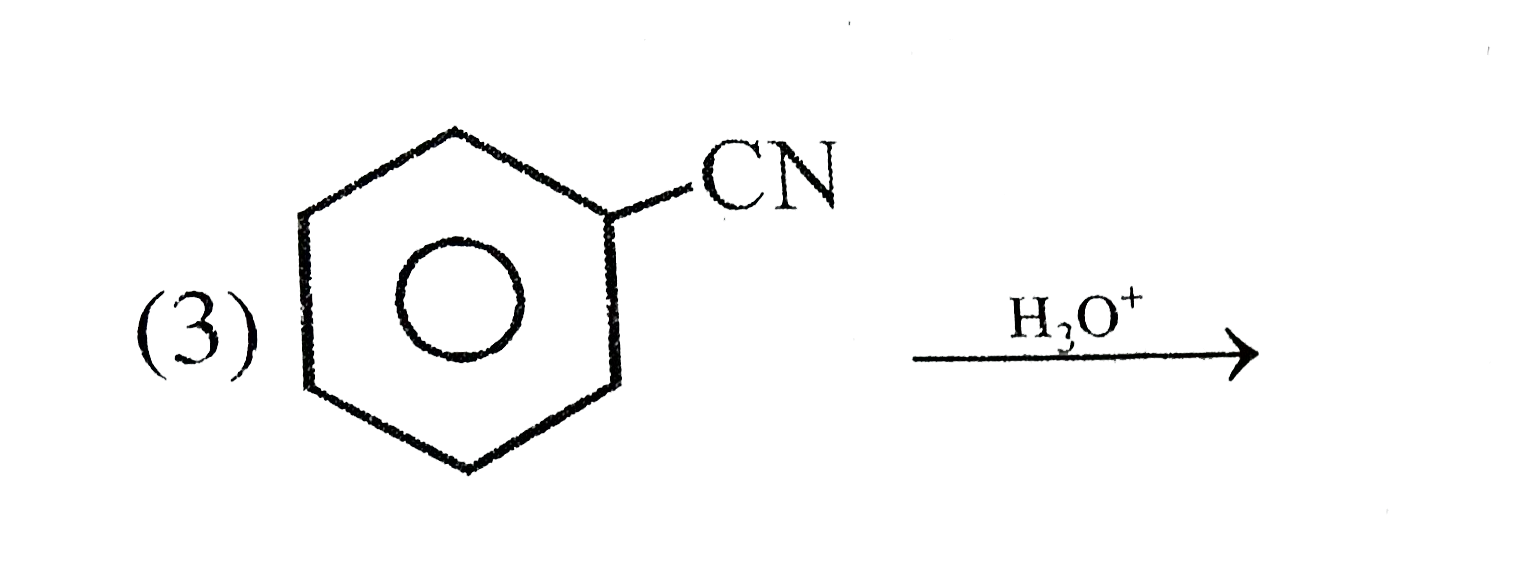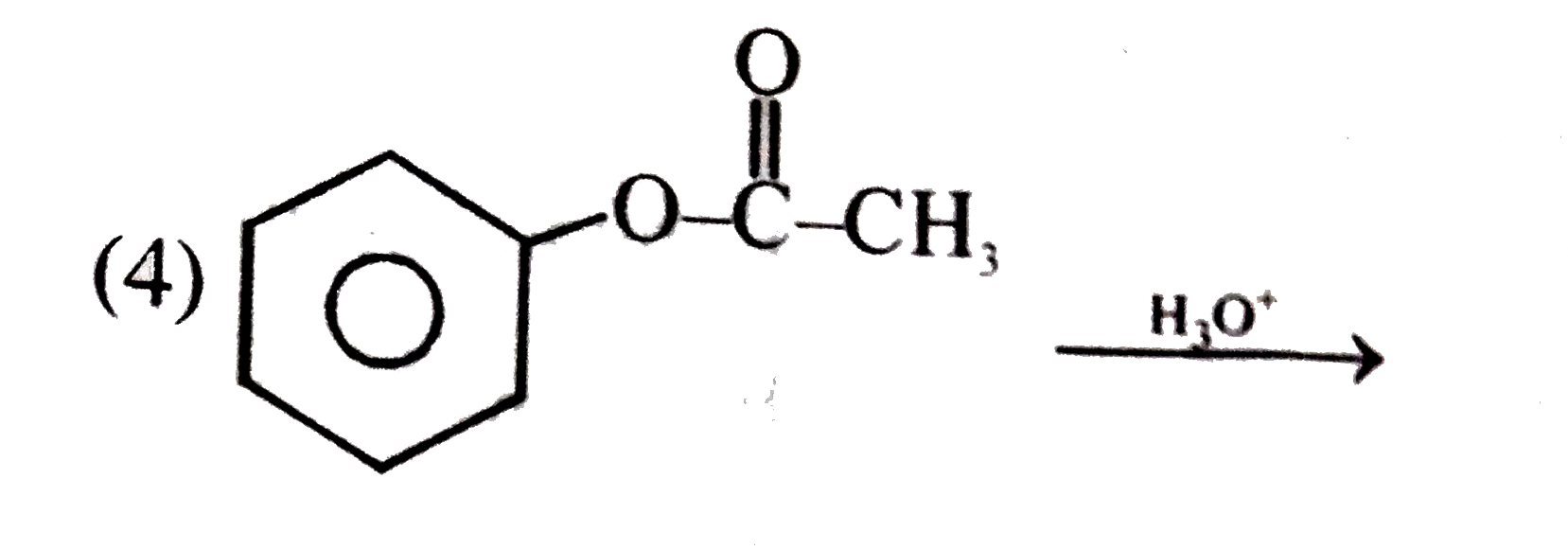Benzoic acid not form in :




The correct Answer is:D
Step-by-Step Solution:
1. Understanding the Question:
The question asks where benzoic acid is NOT formed. We need to analyze each option provided to determine if benzoic acid can be synthesized from the given compound.
2. Analyzing Option 1: Toluene
- Toluene (C6H5CH3) can be oxidized to benzoic acid (C6H5COOH) using KMnO4 and KOH under heating.
- Reaction:
C6H5CH3+KMnO4KOH, heat−−−−−−→C6H5COOKH+−−→C6H5COOH
- Conclusion: Benzoic acid is formed from toluene.
3. Analyzing Option 2: Ethylene (CH2=CH2)
- Ethylene can be oxidized to form carboxylic acids, but it does not lead to benzoic acid specifically.
- However, if we consider a substituted alkene, it can oxidize to yield carboxylic acids.
- Conclusion: This option does not specifically lead to benzoic acid, but it does not rule it out entirely.
4. Analyzing Option 3: Benzonitrile (C6H5CN)
- Benzonitrile can be hydrolyzed to benzoic acid in the presence of water and dilute HCl.
- Reaction:
C6H5CN+H2OHCl, heat−−−−−→C6H5COOH+NH4++Cl−
- Conclusion: Benzoic acid is formed from benzonitrile.
5. Analyzing Option 4: Acetic Anhydride (O=C(O)C=O)
- Acetic anhydride does not lead to the formation of benzoic acid. Instead, it can lead to the formation of phenol under acidic conditions.
- Reaction:
O=C(O)C=O+H3O+→Phenol
- Conclusion: Benzoic acid is NOT formed from acetic anhydride.
6. Final Conclusion:
- Based on the analysis, the compound from which benzoic acid is NOT formed is Option 4: Acetic Anhydride.
Answer: Option 4 - Acetic Anhydride
---
The question asks where benzoic acid is NOT formed. We need to analyze each option provided to determine if benzoic acid can be synthesized from the given compound.
- Toluene (C6H5CH3) can be oxidized to benzoic acid (C6H5COOH) using KMnO4 and KOH under heating.
- Reaction:
C6H5CH3+KMnO4KOH, heat−−−−−−→C6H5COOKH+−−→C6H5COOH
- Conclusion: Benzoic acid is formed from toluene.
- Ethylene can be oxidized to form carboxylic acids, but it does not lead to benzoic acid specifically.
- However, if we consider a substituted alkene, it can oxidize to yield carboxylic acids.
- Conclusion: This option does not specifically lead to benzoic acid, but it does not rule it out entirely.
- Benzonitrile can be hydrolyzed to benzoic acid in the presence of water and dilute HCl.
- Reaction:
C6H5CN+H2OHCl, heat−−−−−→C6H5COOH+NH4++Cl−
- Conclusion: Benzoic acid is formed from benzonitrile.
- Acetic anhydride does not lead to the formation of benzoic acid. Instead, it can lead to the formation of phenol under acidic conditions.
- Reaction:
O=C(O)C=O+H3O+→Phenol
- Conclusion: Benzoic acid is NOT formed from acetic anhydride.
- Based on the analysis, the compound from which benzoic acid is NOT formed is Option 4: Acetic Anhydride.
Topper's Solved these Questions
Similar Questions
Compare the acid strengths of the following:
Benzoic acid and formic acid
View SolutionWhich of the following react with benzoic acid to form ethyl benzoate?
View SolutionConversion of Benzoic acid into aniline
View SolutionWhich of the following gives benzoic acid on oxidation :
View SolutionConversion of Benzoic acid into phenol
View Solution2g of benzoic acid dissolved in 25g of benzene shows a depression in freezing point equal to 1.62K. What is the percentage association of benzoic acid if it forms a dimer in solution ? (Kf for benzene = 4.9 K kg mol−1)
View SolutionStatement-I: Benzoic acid on nitration will give m- nitro benzoic
acid. Because
Statement-II: -COOH group will increase e− density on
meta position.
View SolutionCompare the SIR effect between orthochloro benzoic acid, orthobromobenzoic acid and orthoiodo benzoic acid.
View SolutionBenzoic acid and carbolic acid can be distiguished by:
View SolutionConversion of Benzoic acid to m-Bromoaniline
View Solution
